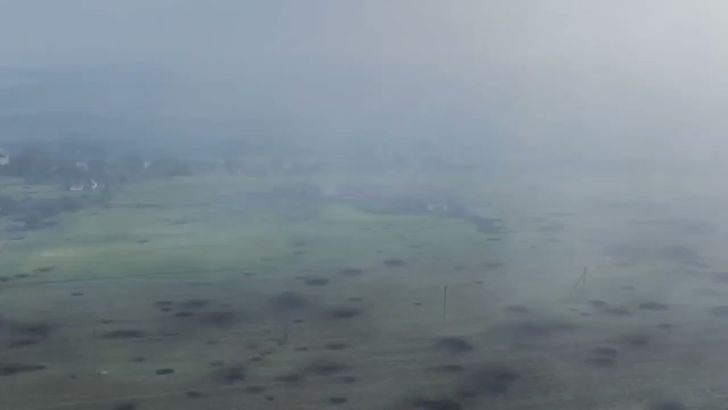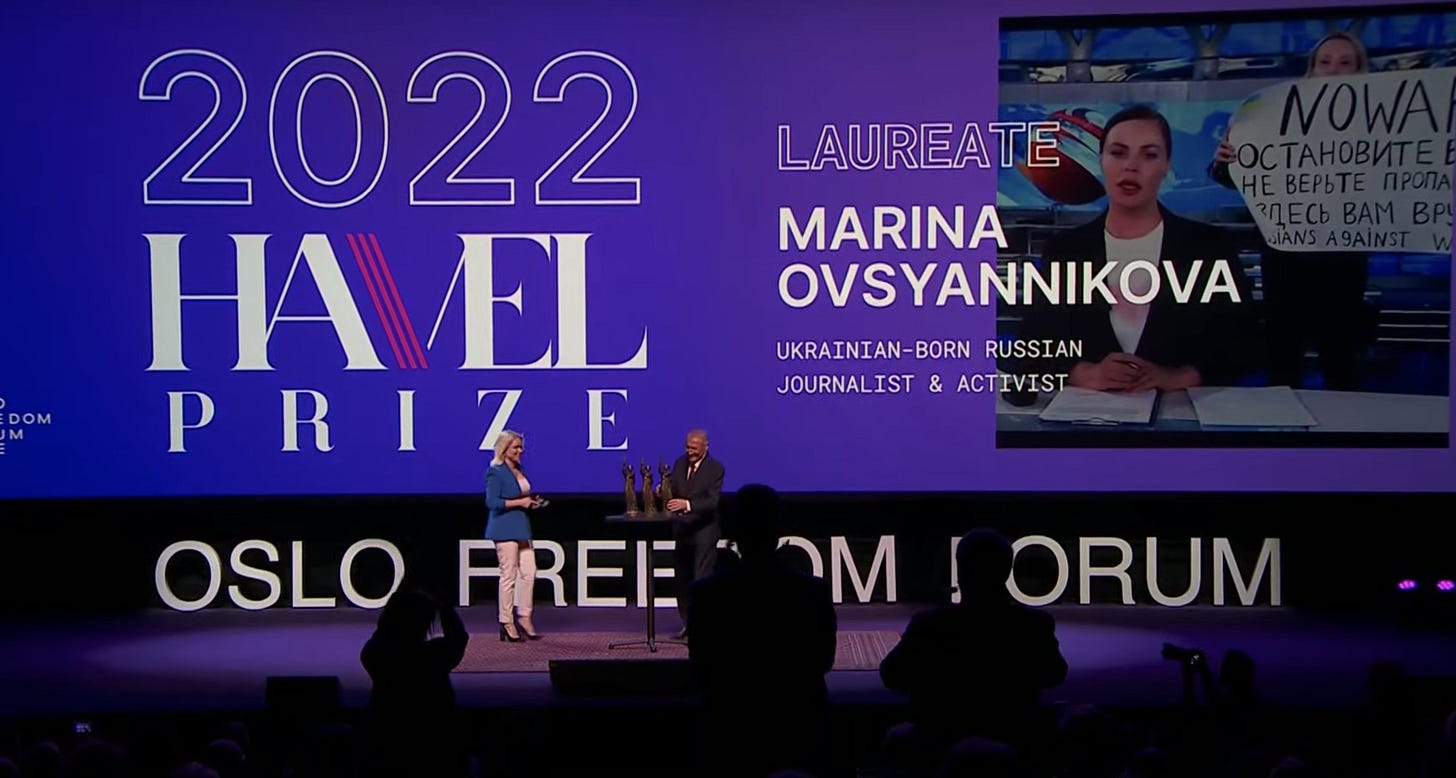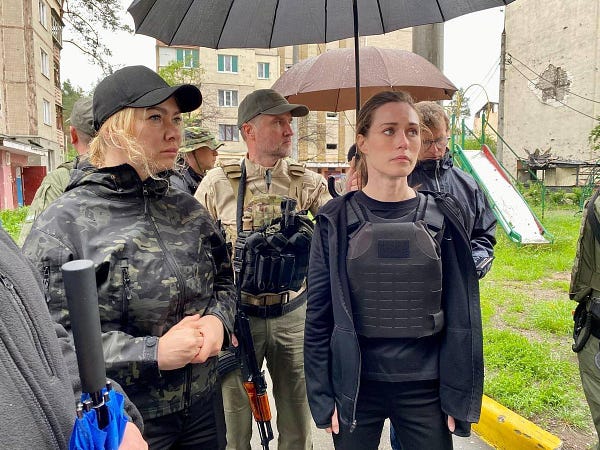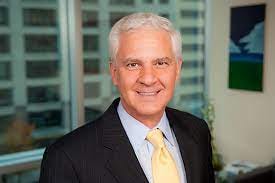Happy Independence Georgia!
Catching up…
EA Worldview’s Ukraine Up-date- hop over to Scott’s amazing hourly Ukraine up-date page. I’ll fill in with some bits and bobs.
Here are some of the stories we’re following…

Passportisation: in yesterday’s post, news of a new law signed by Putin fast-tracking Russian citizenship in the occupied territories (passportisation) signal Putin’s plan to annex the territories in question.


Fighting in Donbas: this is the most heated moment in the battle for Donbas. The Russian troops outnumber Ukrainian forces 7:1. Russian forces have attacked more than 40 towns in the eastern Donetsk and Luhansk region.
"Luhansk has not been cut off," said the region's military administration head, Serhiy Haidai. Fighting has reached the outskirts of the big city of Severodonetsk, a key Russian target. If they capture the road to Bakhmut then the city could be surrounded.
Oleksandr Striuk, head of the Sievierodonetsk city military administration, said despite Russia’s constant attacks, the city is not besieged and has enough Ukrainian troops to hold back Russian forces. Striuk said power and communications systems are down and while the roads remain dangerous.
The Institute for the Study of War said in its May 25 assessment that the intensity of Russian artillery and air attack, combined with the massing of Russian forces from elsewhere suggests Russia may start its offensive on Sievierodonetsk prior to cutting off Ukrainian ground lines of communication.
Ukraine’s Intelligence: Russia uses 60% of its stockpiles of high-precision weapons. Vadym Skibitsky, a representative of the Defense Ministry’s Intelligence Directorate, told Radio Free Europe's Krym Realii that Russia is not able to quickly replenish its reserves.
Presidential advisor Mykhailo Podolyak said that agreeing to give up territories is impossible and would only backfire, as Russia would use the pause in fighting to prepare for further offensives. “It will lead to a larger, more bloody war,” he said.
Rinat Akhmetov, Ukraine’s richest man, said in an interview with Ukrainian media outlet NV, that he will file a lawsuit against Russia, demanding “proper compensation for all losses and lost business.” According to Akhmetov, the losses of his Azovstal and Ilyich steel plants in Mariupol due to Russia’s war range from $17 billion to $20 billion.
Lithuania’s National Defense Minister Anušauskas said that his country would send 20 M113 armored vehicles, 10 military trucks, and 10 SUVs, which can be used for demining operations. “Lithuania stands together with Ukraine,” Anušauskas said.
Ukrainian anarchists have created a headquarters in a basement in Kyiv where they gather supplies to send to their peers on the frontlines and welcome anarchists from abroad who have come to fight.
The Saeima of Latvia in the first reading adopted a bill on the dismantling of all Soviet monuments by November 15.
US rejects Russia's offer to unblock Ukrainian ports in exchange for lifting sanctions. U.S. Department of State spokesman Ned Price called Russia’s suggestion “empty promises.” The quickest solution to rising prices, he said, "is to end the Russians’ brutal war."
RIA: Starting in June, salaries in Russia-controlled Kherson, southern Ukraine, will be paid in rubles.
Foreign companies: Russia is advancing a new law that will allow it to take control of local businesses of western companies that decide to leave Russia because of the invasion of Ukraine.
Food security: There’s hope in the form of harpoon anti-ship missiles, which Denmark and other nations are now sending to Ukraine, according to U.S. officials. Experts say that as few as 12 of these missiles could annihilate Russia’s sea blockade.
German weapons to Ukraine: Scholz’s spokesman argued the German government had been clear from the beginning that it was going to “have to see what we can deliver,” adding: “There was a clear request from the Polish side to transfer state-of-the-art Leopard 2A7 main battle tanks to Poland, but the problem is that the Bundeswehr itself only has a small number — about 50 — of these tanks.”
Macron and dreams of EU autonomy: The French leader is “blowing his opportunity to advance France’s vision of European strategic autonomy due to his lukewarm military support for Ukraine and his determination to keep talking to Russian President Vladimir Putin,” Paul writes. Indeed, countries in Central and Eastern Europe trust the U.S. more than France to defend them from Putin’s Russia.
Hungary and Russian oil and gas: EU Officials and diplomats believe a compromise is still possible to get Hungary on board with a sixth sanctions package against Russia before the summit of EU heads of state and government starts on Monday. Hungary is a headache due to its reliance on Russian oil and gas and also due to the fact that it’s a land-locked state.
NATO members informally agree not to supply Ukraine with aircraft and tanks. Citing its sources in NATO, the German Press Agency reported that alliance members fear Russia could see the delivery of Western tanks and combat aircraft as entering the war.
The Atrocity Crimes Advisory Group (ACA) will support Ukraine’s Prosecutor’s General Office’s war crimes units in their investigation and prosecution of war-related crimes, according to the U.K. government. “The ACA will reinforce current EU, US and UK efforts to further accountability for atrocity crimes in the context of Russia’s ongoing war of aggression against Ukraine,” the U.K. government said.

Politico Brussels- the EU at Davos
EU Parliament president Metsola urged the EU to give Ukraine a real shot at joining the EU. “Ukraine is ready to take it to the next step. Are we ready? I think we should be. Otherwise we will have failed them.” Metsola also called out “Putin sympathizers” within the European Parliament, without naming names. “At the extremes, both on the left and the right, you have Putin sympathizers. You have MEPs that are or have been close to the Kremlin regime.”
Metsola said Putin now has much fewer friends in the Parliament, and those who remain are much less vocal. Why? “Because our populations are holding us to account,” she said, adding that she would urge voters to “hold those members accountable for their decisions and their statements.”
Despite sympathy for European neighbors, like Georgia and other aspiring EU members, Moldova would like more time. “We are implementing the reforms necessary for accession to the EU,” Gavrilița said. “We are talking here to heads of governments, to officials and the private sector about the need to anchor Moldova in the European space.”


D. Patrikarakos, Why Russia Fears the Azov Battalion
“People say that we are heroes,” says Lieutenant Illya Samoilenko. “But heroism only occurs when planning and organisation fails.” It’s early May and Samoilenko, second-in-command of the Azov Battalion that has spent weeks inside Mariupol’s besieged Azovstal steel plant, is talking to journalists in a closed press conference over Zoom.”
Thomas Kent, Russian Propagandists Regain Footing on Ukraine
Now, however, the machine has recovered, becoming more coherent and persuasive, especially in the developing world. How can democratic forces confront these efforts, and maintain broad opposition to the Kremlin’s actions?

Shane Harris, U.S. intelligence document shows Russian naval blockade of Ukraine
A document based on declassified intelligence and released by the U.S. government shows Russian naval operations in the Black Sea from February to May 2022. U.S. and other world leaders have accused Russia of intentionally disrupting global food supplies by preventing Ukraine from exporting grain and other key agricultural products.
Cannes International Film Festival
“The team of the Ukrainian film "Butterfly Vision" at the premiere in Cannes. Under the sound of the siren of the air alarm, they ask the right question to the largest movie theater in the world.”


Aseyev is a renown Ukrainian author
EuroFile@6
Please join us this evening on EuroFile@6 on Spaces with Josh Manning (stepping in for Scott) and Nathalie Vogel. We’ll be asking: how should we be dealing with Putin? What’s the best way to deal with Russia in terms of security? Containment, deterrence? What are the chances of a nuclear war?
We are joined by Joe Cirincione a distinguished fellow at the Quincy Institute for Responsible Statecraft.
He also served as president of the Ploughshares Fund, a foundation that focused on nuclear nonproliferation and conflict resolution. He’s also served as director for non-proliferation at the Carnegie Endowment for International Peace. He’s served as a security advisor to Secretary of State Hilary Clinton and also as a member of the Council on Foreign Relations.
We’re signing off…thanks for reading…
Mo & Scott













